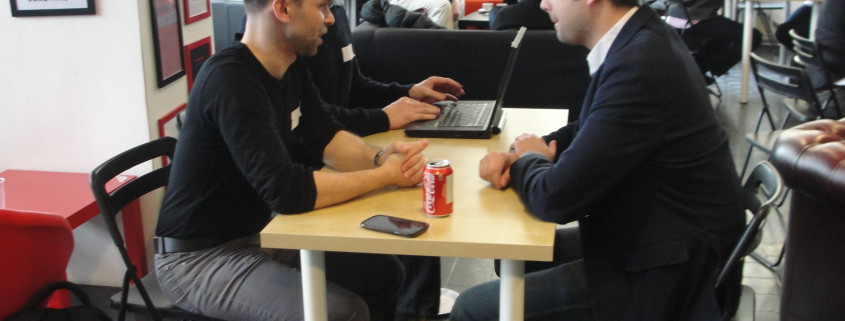How Smart Startups Keep Mentors Engaged
A version of this post originally appeared on the StartupYard blog in January 2016. As a new group of Startups joins us in the next few weeks for StartupYard Batch 10, we thought we’d dive back into a very important topic for them: How do the smartest startups engage their mentors?
But first: why do some of even the most successful startup founders continue to seek mentorship?
Strong Mentors are Core to a Successful Startup

Mergim Cahani (right), CEO of Gjirafa, one of StartupYard’s most successful alumni, is an avid startup mentor himself.
Founders have to balance mentorship with the day-to-day responsibilities of their companies. But sometimes founders approach mentorship as a kind of “detour” from their normal operations- something they can get through before “getting back to work.”
This is the wrong approach. Having worked with scores of startups myself, as a mentor, investor, and at StartupYard, I can comfortably say that those who engage with mentors most, get the most productive work done. Those who engage least, are generally the most likely to waste precious time.
How can that be? Well, simply put, the first line of defense against the dumbest, most avoidable mistakes, are mentors who have made those mistakes themselves. I’ve seen this happen: a startup decides they’re going to try a certain thing, and it’s going to take X amount of work (often a lot of work). They mention it to a mentor, who forcefully advises that they not do it. The mentor tried it themselves, and failed.
Now this startup has 2 options: proceed knowing how and why the mentor failed, or change direction to avoid the same problems. Either way, an hour-long discussion with a mentor will probably have saved time and money, simply by raising awareness. I have seen 20 minute conversations with mentors save literally months of pain and struggle for startup founders.
Recently, one of our founders reached out to a handful of mentors for information on an investor who was very close to signing on as an Angel. The reaction was swift, and saved the founder from making a very serious mistake. The investor turned out to have a bad reputation, and was a huge risk. As a result, mentors scrambled to suggest alternatives and offer help securing the funds elsewhere. That is what engaged mentors can do for startups.
Engaged Mentors Defeat Wishful Thinking
There’s a tendency, particularly among startups that haven’t had enough challenging interactions with outsiders, to paper-over issues that the founders prefer not to think about. Often there “just isn’t enough data,” to prove or disprove the founders’ theories about the market.
Conveniently, “lack of data,” or “need for further study,” can serve as an excuse for not making decisions. That’s one of the main reasons startups fail – refusing to make a decision before it’s too late.
We like to focus on things we can control, and things we have a hard time working out appear to be outside of that sphere, so we are more likely to ignore them, or hand-wave their importance away.
Founders sometimes long to go back into “builder mode,” and focus solely on executing all the advice they’ve been given. And they do usually still have a lot of building to do. But one common mistake -something we see every single year- is that startups will treat mentors as the source of individual ideas or advice, but not as a wellspring of continuing support and continual challenges.
The truth is that a great mentor will continually put a brake on your worst habits as a company. They will be a steadfast advocate of a certain point of view- hopefully one that differs from your own, and makes you better at answering tough questions. But you have to bring them in.
Treat Your Mentors like Precious Resources
I can’t say how many times great mentors, who have had big impacts on the teams they have worked with, have come to me asking for updates about those teams. These mentors would probably be flattered to hear what an effect they’ve had on their favorite startups, but the startups often won’t tell them. And the mentors, not knowing whether they’ve been listened to, don’t press the issue either.
Mentors need care and feeding. They need love. Like in any relationship, this requires effort on both sides.
But time and again, mentors who are ready to offer support, further contacts, and more, are simply left with the impression that the startup isn’t doing anything, much less anything they recommended or hoped the startup would try.
Mentors who aren’t engaged with a startup’s activities won’t mention them to colleagues and friends. They won’t brag about progress they don’t know about, and they won’t think of the startup the next time they meet someone who would be an interesting contact for the founders.
This isn’t terribly complicated stuff. Many founders fear at first that “spamming” or “networking,” is the act of the desperate and the unloved. If their ideas are brilliant and their products genius, then surely success will simply find them. Or so the thinking goes.
Alas, that’s a powerful Silicon Valley myth. And believe me: it doesn’t apply to you. Engaging mentors is just like engaging customers: even if you’re Steve Jobs or Elon Musk, you still need to be challenged and questioned. You still need support.
As always, there are a few simple best practices to follow.
1. A Mentor Newsletter
Two of StartupYard’s best Alumni, Gjirafa and TeskaLabs, provide regular “Mentor Update” newsletters. These letters can follow a few different formats, but the important things are these: be consistent in format, and update regularly. Ales Teska, TeskaLab’s founder, sends a monthly update to all mentors and advisors.
In the email, he has 4 major sections. Here they are with explanations of the purpose of each:
Introduction
Here you give a personal account of how things are going. You can mention personal news, or news about the team, offices, team activities, and other minutiae. This is a good place to tell small stories that may be interesting to your mentors, and will help them to feel they know you better. Did a member of the team become a parent? Tell it here. Did you travel to Dubai on business? Give a quick account of the trip.
Ask
This is one section which I love about Ales’s emails. I always scroll down to the “ask” section, and read it right away. Here, Ales comes up with a new request for his mentors every single time. It can be something simple like: “we really need a good coffee provider for the office,” to something bigger, like “we are looking for an all-star security-focused salesman with 10 years experience.”
Whatever it is, he engages his mentors to answer the questions they know, by replying directly to the email. This way, he can gauge who is reading the emails, and he can very quickly get great answers to important questions or requests.
Audience engagement happens on many levels. Not everything engages every mentor all the time, and that’s important to keep in mind. A simple question can start an important conversation. You don’t know what a mentor has to offer you until you find the right way to ask for their help.
Wins
Here, Ales usually shares any good news he has about the company. This section is invaluable, because it reminds mentors that the company is moving forward, and making gains. A win can be anything positive. You can say that a win was hiring a great new developer, or finally getting the perfect offices. Or it can be an investment or a new client contact. These show mentors that you are working hard, and that you are making progress and experiencing some form of traction.
You’d be surprised how many mentors simply assume that a startup that isn’t talking about any successes, must have already failed. StartupLand in can be like Hollywood that way: if you haven’t seen someone’s name on the billboards lately, it means they’ve washed out.
The fact might be that you’re quietly doing great business, but see what happens when someone asks about you to a mentor who hasn’t heard anything in 6 months. “Those guys? I don’t know… I guess they aren’t doing much, I haven’t heard from them in a while.” There’s no good reason for that conversation to happen that way.
KPIs
Here Ales shares a consistent set of Key Performance Indicators. In his case, it is about the company’s sales pipeline, but for other companies, it might be slightly different items, such as “time on site,” or “number of daily logins,” or “mentions in media.” Whatever KPIs are most important to your growth as a company, these should be shared proactively with your mentors.
If the news isn’t positive, then explain why. You can also have a little fun with this, and include silly KPIs like: “pizza consumed,” or “bugs found.” This exercise shows mentors that you are moving forward, and gives them a reliable and repeatable overview of what you’re experiencing in any given week.
I heard one mentor complaining not long ago about these types of emails. “The KPIs don’t change that much, it’s always the same thing.” But he was thinking about the startup in question. The fact that the KPIs hadn’t changed might be a bad sign to the mentor, but probably the absence of any contact would be worse. At least in this case, the mentor might care enough to reach out and ask what’s going on.
2. Care and Watering
Mentors aren’t mushrooms. They don’t do well in the dark. Once you’ve identified your most engaged mentors, you need to put in as much effort in growing your relationship as you expect to get back from them.
How can you grow a relationship with a mentor? Start by identifying what the mentor wishes to accomplish in their career, in their life, or in their work with you. Do they want to move up the career path? Do they want to do something good for the human race? Do they just want to feel needed or important?
A person’s motivations for mentorship can work to your advantage. Try and help them achieve their goals, so that they can help you achieve yours.
Does a mentor want his or her boss’s job? Feed them information that will help them get ahead of colleagues and stand out. Mention them in your PR, or on your blog to enhance their visibility.
Does the mentor want to be a humanitarian? Show them the positive effects they’ve had by sending them a letter, or inviting them to a dinner.
Does the founder yearn to be needed? Include his/her name in your newsletter and highlight their importance to your startup. These things are all easy to do, and can be the difference between a mentor choosing to help you, and finding other things to do with their busy schedules.




